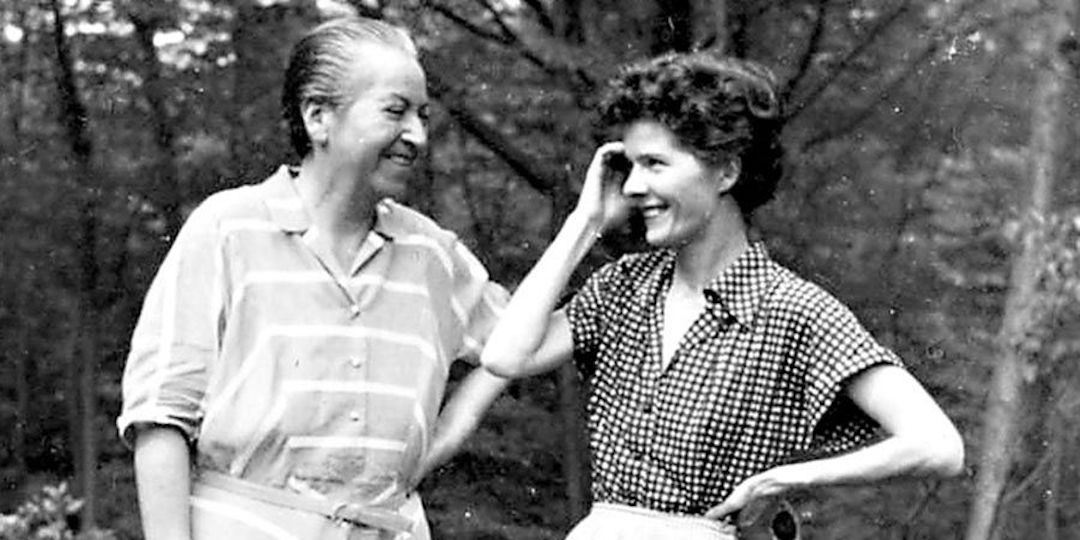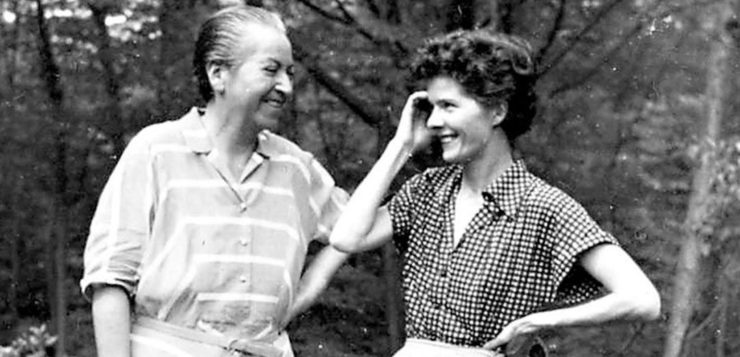BORN Lucila Godoy Alcayaga in the little village of Vicuña, Chile, in 1889, the poet known to the world as Gabriela Mistral was the first Latin American author to receive the Nobel Prize for literature, which she won in 1945 for her “lyric poetry inspired by powerful emotions.” Of humble origins, graced with strong indigenous features, and possessed of an indomitable character and high intelligence, Lucila quickly progressed from teaching first graders in her native town to becoming the headmistress of Chile’s most prestigious school for girls. Soon she was leading the Mexican education system reform by the express invitation of the country’s Minister of Education.
In monuments dedicated to her and on the 5,000 Chilean peso bill, Mistral is shown as a frowning woman in a two-piece suit, manly shoes, and grey hair pulled into a severe bun. Even posthumously, during the 1970s and 1980s, the military government of General Augusto Pinochet, used Mistral’s image as a symbol of what the regime wanted Chilean women to be—self-effacing, sexless, and respectful of the established social order. In reality, Mistral was anything but that propagandized ideal.
For starters, Gabriela Mistral spent most of her adult life in a loving relationship with another woman, Doris Dana, who was officially her companion, secretary, and finally the executor of her estate. “I know very well that, except for us, no one, no person in this world can possibly understand the essence of our life together,” Mistral wrote in one of her letters to Doris. This letter, which was overflowing with love and passion, had been kept secret for more than fifty years, until Dana’s death in 2006, when her niece Doris Atkinson donated these letters to the Chilean National Library. The upshot was a disclosure that finally destroyed the myth of “Saint Gabriela,” who had been thought a brilliant but sad and uncomely poet, a spinster incapable of passion who wrote about love and betrayal without ever having experienced them firsthand.

From the late 1930s until her death in 1957, Mistral was in the diplomatic service and moved from post to post: Santa Barbara, California; Jalapa in Veracruz, Mexico; and Naples, Italy. But by 1946, life without her beloved Yin Yin seemed bleak and not worth living despite her fame and comfortable economic circumstances. Then she met Doris at a lecture at Barnard College, where the 28-year-old woman was a student.
“My beloved teacher,” Dana wrote to Mistral, “I’m writing to express to you, as much as I can in a letter, the profound gratitude I feel for the great privilege of translating your potent and powerful essay, ‘The Other German Disaster,’ into English.” It was thanks to this letter that Mistral’s achromatic universe erupted into a thousand colors. Her world, expressed in her later poetry, became bright and beautiful and she, Gabriela Lucila, was a planet caught in the orbit of Doris’ love.
Mistral’s story in many ways mirrors that of Gertrud Stein. They were contemporaries, and both were brilliant writers who chose to live far away from their homeland. But whereas Gertrude Stein, who moved from California to Paris, flaunted her relationship with the much younger Alice B. Toklas and openly called her “wifey,” Mistral was constrained by the conservatism of Latin American culture and forced to disguise her same-sex relationships, even before meeting Dana. When Dana moved in with her, she justified the arrangement by claiming that she wasn’t a good cook and couldn’t manage her own finances, and thus required a helping hand, a female friend, who would take care of the writer’s mundane needs.
The image of Mistral as a stern “mother of the nation” endured for decades and lives on even now. The issue of her sexuality is still considered taboo in traditional Chilean society, and it’s discussed in hushed tones by the International Gabriela Mistral Foundation. “As a foundation, our only concern is her literary legacy,” explained Gloria Garafulich-Grabois, a member of the board of directors of the New York-based institution. What is important is her work. We respect her choices, but we don’t talk about them.”
However, there’s a glimmer of hope in a new generation of young admirers. For example, one of Mistral’s best-known poems has been immortalized in a popular Spanish song;
Give me your hand and give me your love,
give me your hand and dance with me.
A single flower, and nothing more,
a single flower is all we’ll be.
I’m called Hope and you’re called Rose:
but losing our names we’ll both go free,
a dance on the hills, and nothing more,
a dance on the hills is all we’ll be.
Few of Mistral’s poems have been translated, and she is not as well-known as her fellow Chilean and Nobel Prize winner, Pablo Neruda. But her letters to Doris are now available in English, edited and translated by Velma García-Gorena in 2018, so perhaps her reputation is growing in the English-speaking world. The original Spanish letters can be found on-line at the National Library of Chile, at last shedding some light on her personal life and correcting the misperception of Mistral as a lonely and embittered spinster.
J. B. Polk is a British short story writer who has lived in Chile.







Discussion1 Comment
Are you serious? Mistral said Chilean Feminism was like a sponge. Her dedication to the Chilean Police Force is not written with post memory but as the first Latin American Woman to win the Nobel Prize for Literature. In her 1945 acceptance speech, she said “I am a daughter of Chilean Democracy”. Like most re-constituting intellectuals, you are probably putting Mistral in a balaclava with Pussy Riot lipstick like 8M and all other New Social Bowel Movements. That your entry comes up in a Google search for “Mistral dedication to the Police” shows what is lost in translation. Go back to the comic strip literacy your article displays or your could use AI to write your next short story writing.